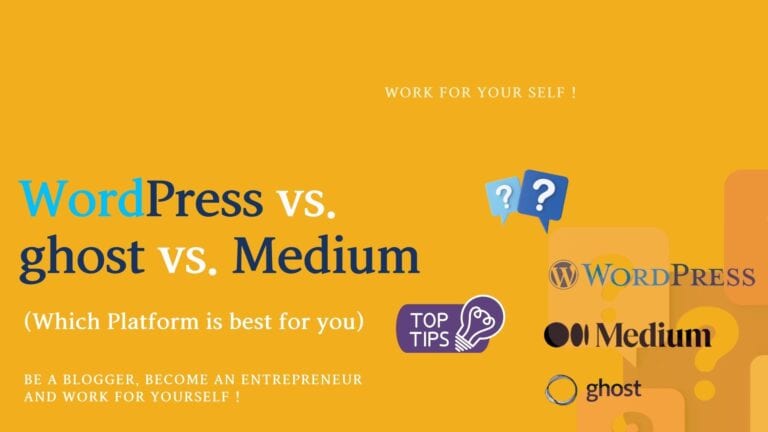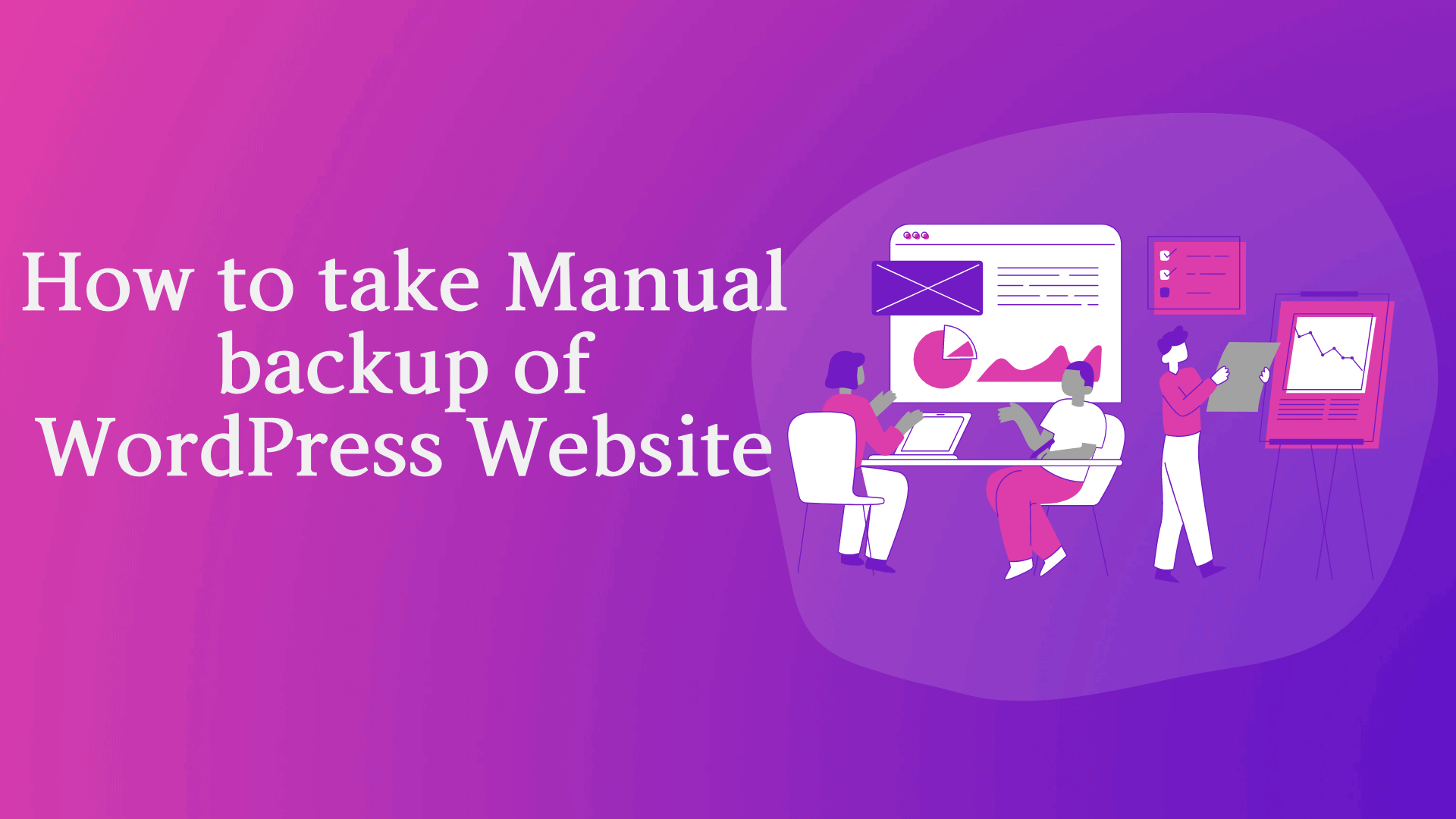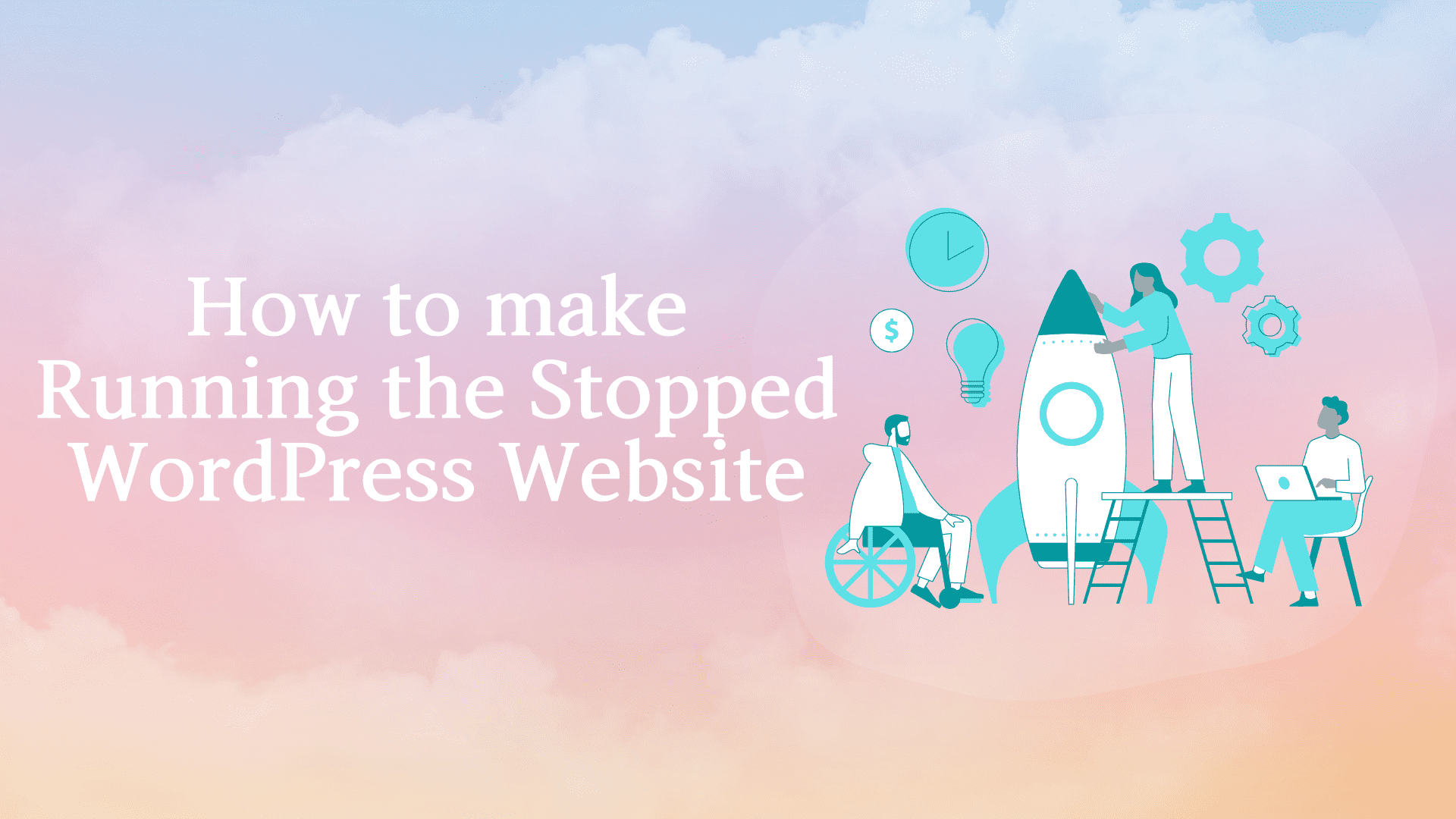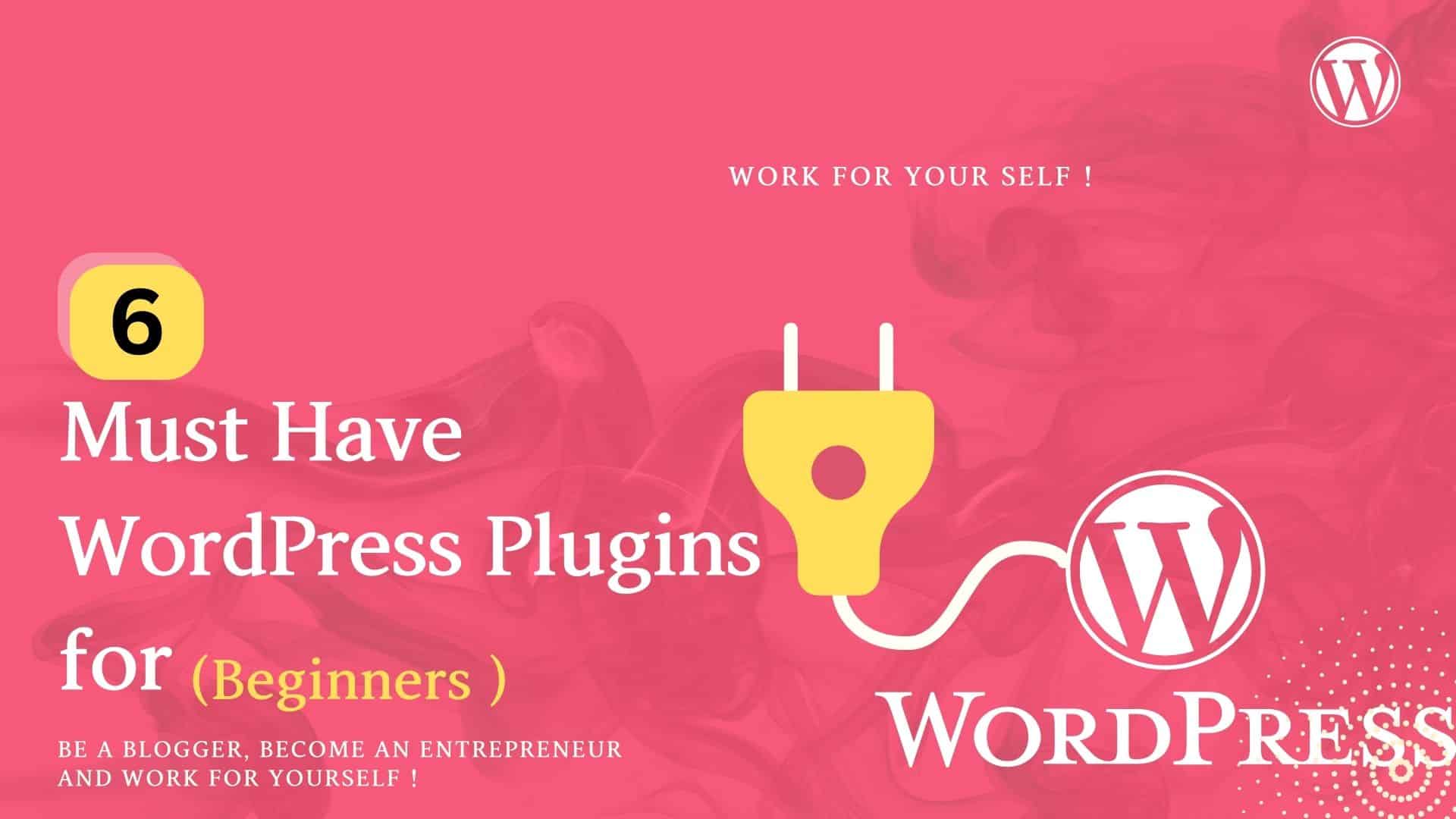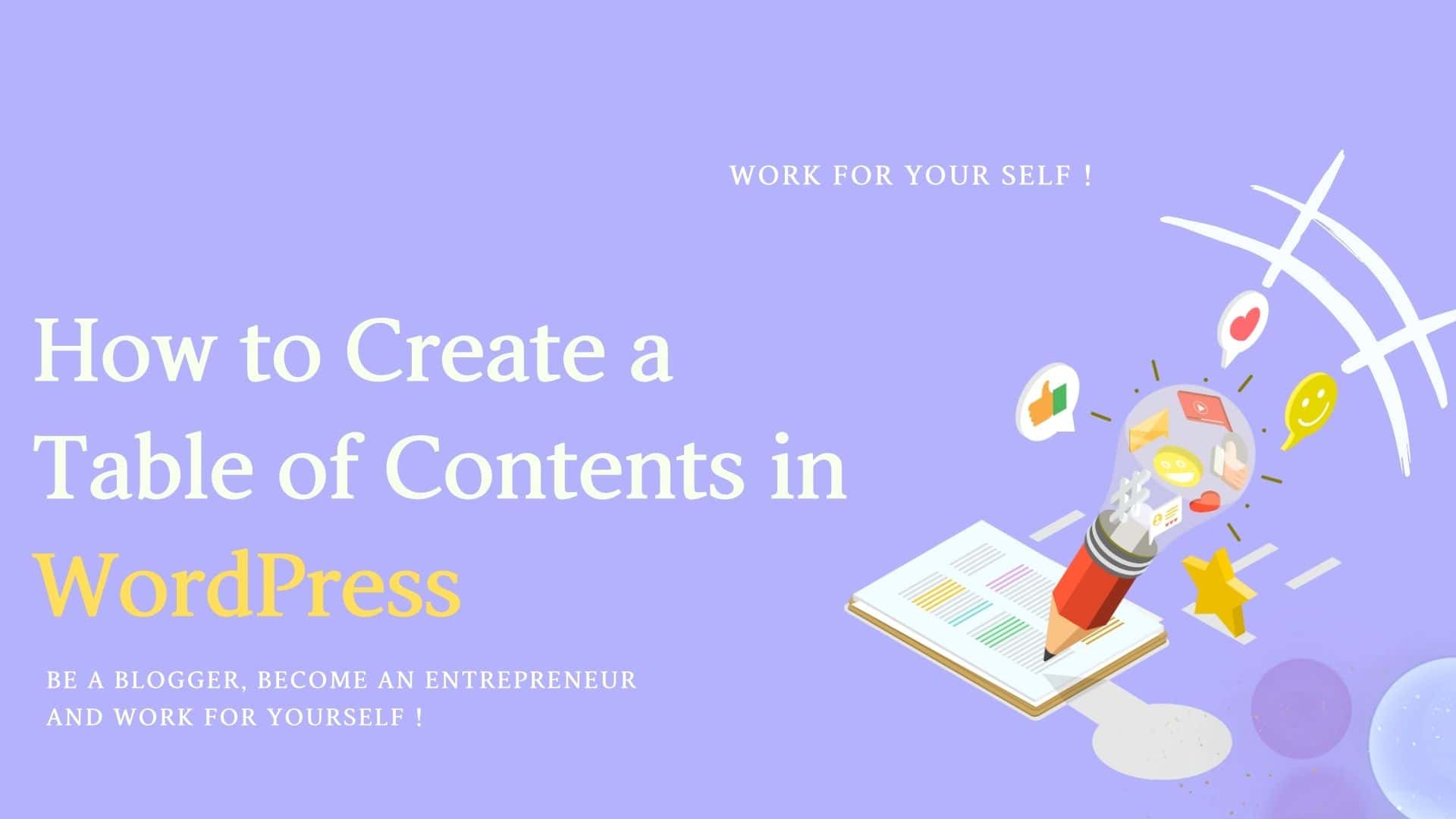WordPress, Ghost, and Medium are popular content management and blogging platforms.
Each has features and benefits that may make it more suitable for specific use cases.
Let’s see an overview and compare WordPress vs Ghost vs Medium to decide which platform may work best for your needs.
By seeing its comparison, you can get the key similarities and significant differences between these three platforms.
Here, we will compare its features like ease of use, customization, cost, and overall popularity.
With this information, you can better determine which platform aligns closest with your goals, technical skills, budget, and preferences for your website or blog.
All three platforms are used to make online content easy and available.
Let’s explore the different ways that appeal to different audiences by comparing WordPress, Ghost, and Medium Platform.
Table of Contents
ToggleWordPress

WordPress has grown tremendously over the past two decades. It was started in 2003 by developers Matt Mullenweg and Mike Little.
It is an open-source content management system (CMS) that has quickly become the most popular CMS.
The primary purpose of WordPress is to provide an easy-to-use platform for creating and managing websites without knowing how to code.
You can easily start Blogging in WordPress without any coding knowledge.
WordPress offers an excellent way for individuals and businesses to build professional websites quickly and cheaply.
Let’s look at WordPress’s features, pros and cons, and limitations.
WordPress Features
1. Ease of use– WordPress has a user-friendly interface, which makes it accessible for beginners to create and manage websites.
2. Customizability: Users can personalize their websites according to their needs and preferences with the help of thousands of themes and plugins available in WordPress.
3. Content management system: WordPress provides a powerful content management system (CMS) that allows users to create, edit, and organize their website content easily.
4. SEO-friendly: WordPress is designed to be search engine optimization (SEO) friendly, making it easier for websites to rank higher in search engine results.
5. Mobile responsive: Most WordPress themes are designed to be mobile responsive, ensuring that websites display correctly on different devices.
Pros of WordPress
1. Easy to use – WordPress is user-friendly. You can easily navigate its dashboard.
No coding skill is required for publishing content, creating pages, and updating settings, which is accessible to beginners.
At the same time, there are tons of options for more advanced users to customize their site.
2. Open Source and Free- WordPress code is publicly accessible for anyone to use, modify, and distribute. As an open-source project, WordPress benefits from thousands of developers contributing and improving the platform.
It can be used to build and function websites for free.
3. Bigger community- WordPress has a large community of users and developers who actively contribute to its development and provide support through forums and online communities.
If you ever encounter an issue, you can find the solution through WordPress knowledge bases, forums, and discussion boards.
There are many resources available thanks to the vast number of users.
4. Plugins and Themes- There are over 55,000 plugins in the WordPress repository to add features like contact forms, e-commerce, SEO, security, social media integration, and more.
Thousands of free and premium WordPress themes are available to change your site’s design and glance.
5. SEO- WordPress sites are search engine friendly by default, and there are many SEO plugins like Yoast SEO to optimize your content.
6. Cost-effective: Due to the open-source platform, it is free to use and has a large community of developers contributing to its growth and improvement.
7. Flexibility: WordPress can create various websites, including blogs, e-commerce stores, portfolios, and more.
8. Scalability: WordPress websites can easily handle high traffic and can be scaled to accommodate the website’s growth.
Cons of WordPress
1. Vulnerable to Attack- WordPress is a major target for hackers. Its open-source nature means vulnerabilities can be found and exploited. Users must stay vigilant while the core software is constantly updated for security.
2. Complexity for beginners- While WordPress is easy for blogging, developing complex sites requires more advanced skills. Tasks like installing plugins, custom themes, integrations, and handling migrations might be challenging for beginners.
3. Resource Intensive- Complex sites with heavy traffic may require dedicated hosting plans to handle the demands. Load times can also suffer without proper optimization and caching.
Limitation of WordPress.
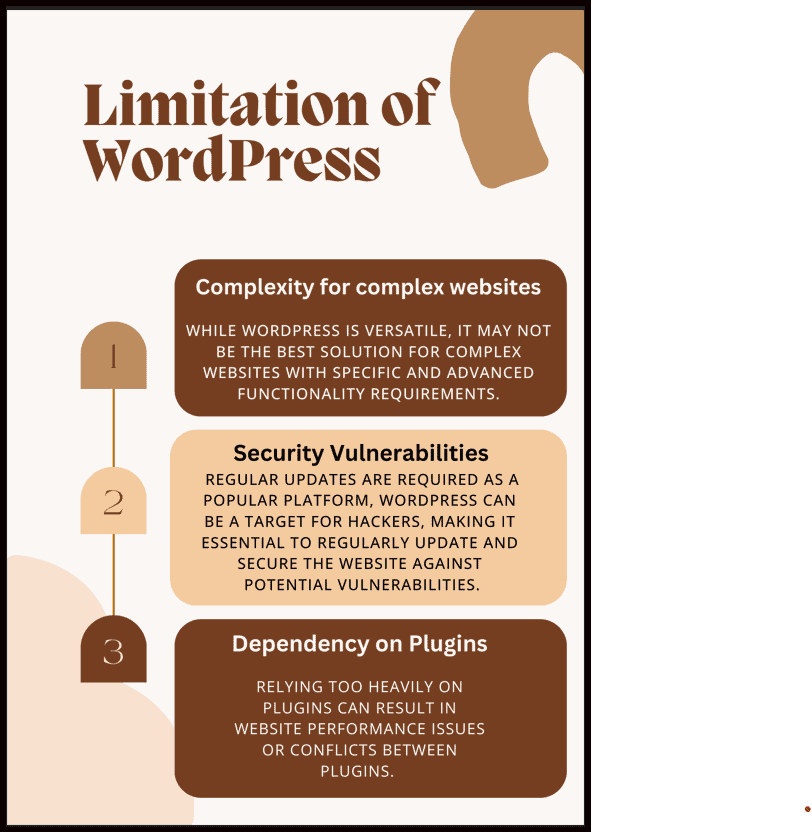
Ghost

Ghost is a modern CMS that stands out for its simplicity and focus on blogging.
Designed by and for professional bloggers, Ghost offers a streamlined experience for content creation and publishing.
Its minimalistic editor ensures a distraction-free writing environment, allowing content creators to concentrate solely on their work.
Ghost CMS is a content management system with several features, pros and cons, and some limitations; let’s explore it.
Features of Ghost
- Friendly Interface- Ghost interface is simple and user-friendly.
- Performance– Ghost work on Node.js CMS framework, enhancing its speed and performance.
- Built-in SEO Optimization– They have built-in SEO tools that optimize your content on search engines.
Pros of Ghost
1. User Interface- Ghost has a clean and minimalistic user interface. Its straightforward and intuitive design enables users to quickly adapt to the system, making it well-suited for bloggers and writers.
2. Speed- Ghost is known for its exceptional site loading speed and performance. Its architecture is purpose-built to prioritize speed, resulting in fast page load times, smooth navigation, and optimal user experience.
This can significantly impact search engine rankings and improve overall user satisfaction.
3. Native Markdown Support– Ghost supports writing and formatting content using Markdown, a lightweight markup language.
Markdown simplifies the content creation and allows writers to focus on the text rather than complex formatting options. This can increase productivity and efficiency for bloggers who prefer a text-based writing workflow.
4. Active and big community– Due to its straightforward and intuitive interface design, Ghost has an active and robust community of developers who provide valuable support to users.
5. Publishing tools– Ghost has powerful professional tools like a custom design, newsletter, and membership.
6. Native Content Memberships- Ghost CMS offers native support for content memberships, allowing you to monetize your content without additional fees or third-party integrations.
Cons of Ghost
1. Limited Plugin and Theme Options- Unlike WordPress, Ghost has a limited selection of plugins and themes.
This could pose a challenge for users who require extensive customization or specific functionality.
2. Learning Curve for Advanced Customization- Ghost offers a robust and flexible theme styling system called “Ghost Themes.”
However, customizing themes or implementing advanced features might require a knowledge of front-end development, making it less accessible for users with limited coding skills.
3. Expensive- As compared to WordPress or some other blogging platforms, Ghost can be a little expensive for creating a good quality website.
Limitation of Ghost.
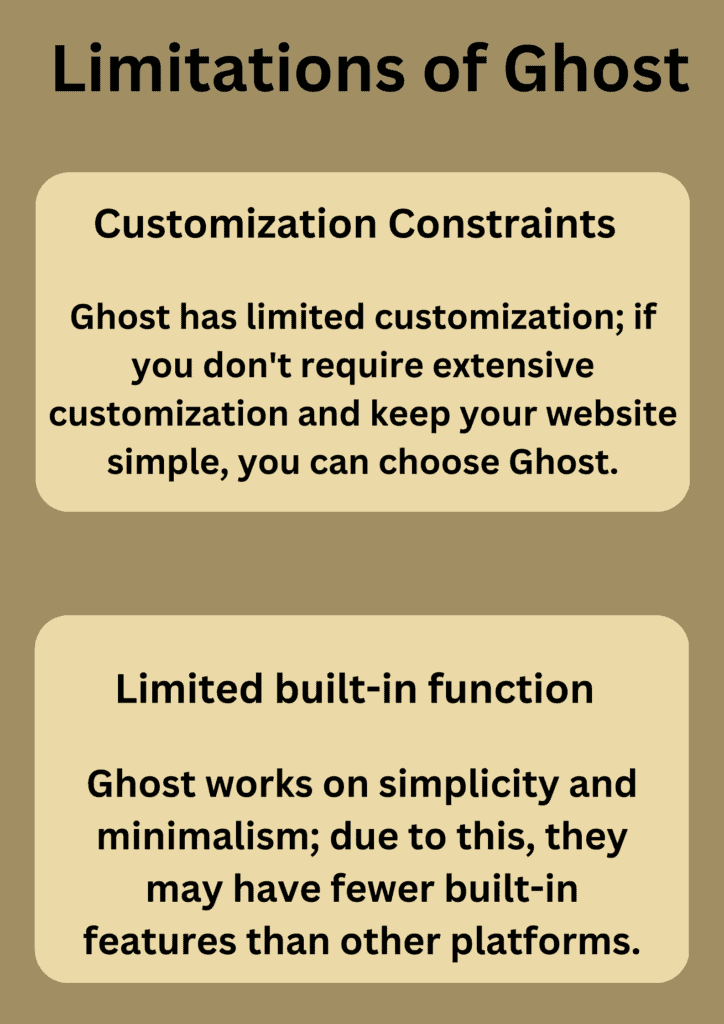
Medium
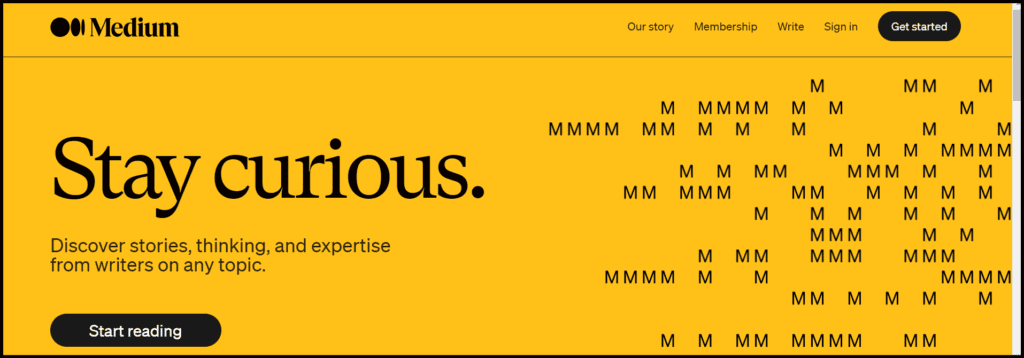
Medium, founded by Evan Williams, is an online publishing platform.
Here, the writer can share stories and ideas with a global audience.
It aims to provide a space to share insightful perspectives, helpful knowledge, and life wisdom.
Medium is a popular online publishing platform offering its readers various features and benefits. However, it also has certain limitations that users should be aware of.
Medium’s essential features, pros and cons, and some limitations are here. Let’s see that.
Features of Medium
- Quality Content: Medium attracts its audience with perfect writing and reading experience.
- Social Interaction– Medium allows users to engage with other users through comments and recommendations, nurturing a sense of community among writers and readers.
- Publishing Tools: Medium provides a user-friendly interface and formatting tools. That helps the user in creating content.
Pros of Medium
1. Simplicity and User-Friendly – Medium is renowned for its user-friendly interface, making it easy for beginners to publish content quickly.
2. Built-In Audience- Medium boasts a large, engaged community of readers and writers. As a result, content published on Medium has a higher chance of reaching a wider audience.
3. Integrates social media- Its participation in social media functionalities is seamless, allowing readers to leave comments, highlight text, and share posts easily across various platforms.
This fosters interactive communication between authors and readers, enhancing engagement.
4. Many Readers and Users- Medium is emerging and growing constantly. You can reach many targeted audiences by creating excellent and relevant content.
5. Large Audience- Medium is growing its user base, allowing its writers to reach a broad audience.
6. Visibility and Discoverability: Medium’s algorithms and recommendation system help surface quality content to its readers.
7. Built-in Distribution: The medium writer can focus on his content as the Medium handles hosting, distribution, and technical aspects of publishing.
Cons of Medium
1. Limited Customization- Medium offers limited customization options compared to WordPress.
Your ability to modify your Medium publication’s layout, typography, and design is restricted, making it challenging to create a unique and personalized brand identity.
2. Content Ownership Concerns- You contribute to a centralized platform when publishing on Medium.
While Medium allows you to export your content, you do not have complete control over the platform or the long-term accessibility of your work.
3. Limited Monetization- While Medium offers a Partner Program that allows writers to earn revenue through subscription fees and engagement metrics, it’s still a relatively new concept.
Earning a substantial income solely from writing on Medium can prove challenging for many writers.
Limitation of Medium.
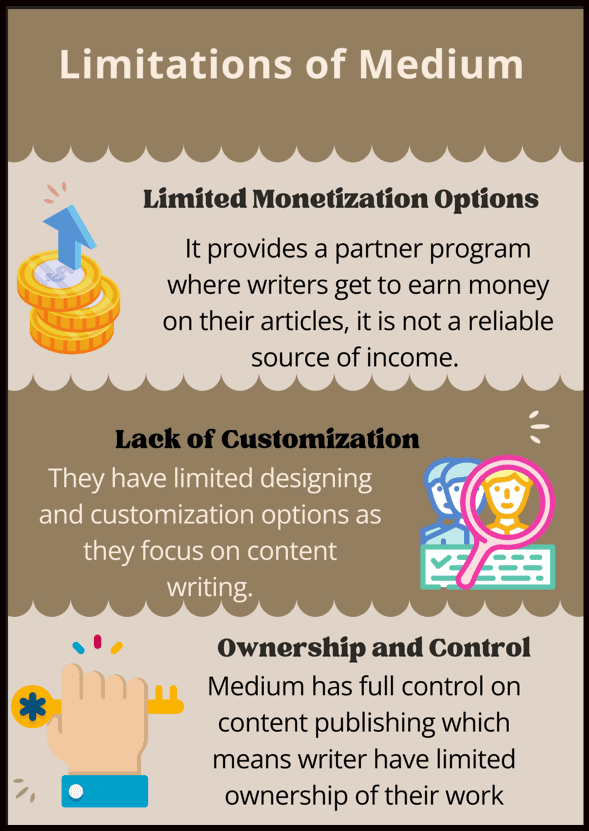
Comparison Based on Ease of Use between WordPress vs. Ghost vs. Medium
WordPress, Ghost, and Medium are all popular blogging platforms, but they differ in terms of ease of use.

WordPress
Themes– WordPress has thousands of free and premium themes available to customize the design and layout. There are themes for blogs, e-commerce, portfolios, magazines, and more.
Custom Domains-WordPress allows you to connect your custom domain.
Formatting option-WordPress provides options to format text with headings, bold, italics, links, lists, quotes, etc
Multimedia-Support embedding photos, videos, audio clips, tweets, and other media into articles seamlessly. WordPress has a slight advantage in most multimedia plugin option.
Ad Monetization-WordPress currently only has an option for built-in plugins for ad monetization are only available.
Ghost
Themes– Ghost offers a handful of free themes to choose from with a simple, clean look. There are not as many options as WordPress but the core themes are still highly customizable
Custom Domains– Liked WordPress allows you to connect with your own custom domain.
Formatting Option– Ghost just like WordPress provides an option in which we can format text, bold its headings, links, lists etc.
Multimedia– Ghost also supports embedding photos, videos, audio clips, tweets, and other media into articles seamlessly.
Ad Monetization– Ghost use third-party services for ad monetization.
Medium
Themes– Medium only has a set theme and style that is optimized for long-form reading. There are no options to change the theme or layout.
Custom Domains– Medium only allows subdomains of medium.com
Formatting Option– Medium has basic formatting but fewer options than the others.
Multimedia– Medium just like Ghost and WordPress supports embedding photos, videos, audio clips, tweets, and other media into articles seamlessly.
Ad Monetization– Use third-party services for ad monetization.
A Comparison Based on Customization Features Available on WordPress, Ghost, and Medium.
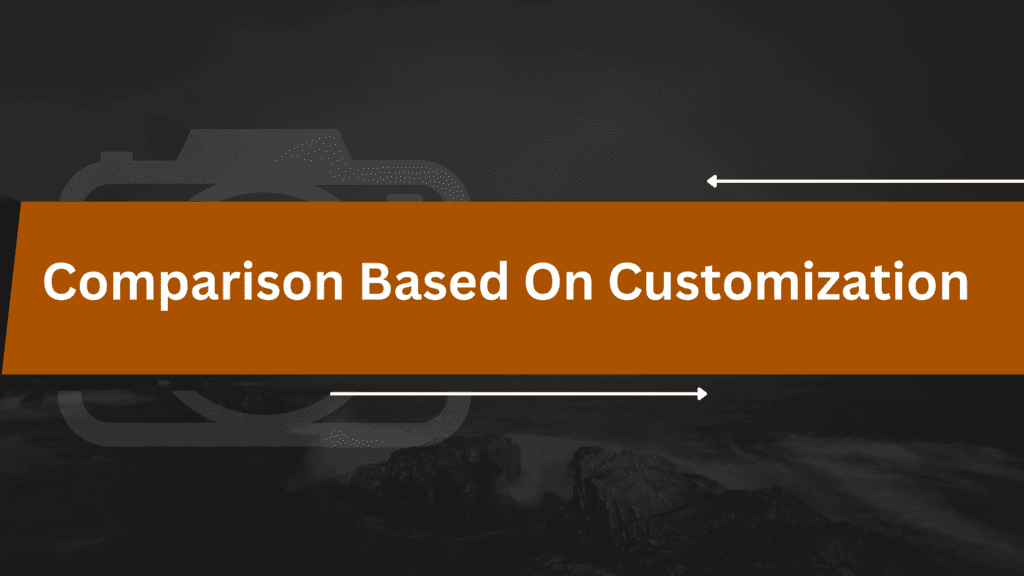
WordPress, Ghost, and Medium are all popular platforms for creating and publishing content online. Still, they differ in flexibility and the extent of customization options available.
When we talk about WordPress there are 2 things.
WordPress.org (Completely free)
WordPress.com (free+ Paid plan)
You can check our blog on WordPress.org vs WordPress.com to understand better this
WordPress
WordPress is a highly versatile platform, offering extensive customization options for content and design.
It provides a wide range of free and paid themes that can be customized.
WordPress allows users to install and modify plugins to enhance functionality and customize various aspects of the site.
This level of customization makes WordPress suitable for users who prioritize creative control and want a highly personalized website or blog.
Ghost
Ghost is a minimalist platform focusing on simplicity and ease of use.
While it offers a clean and modern design, the customization options are comparatively limited.
Ghost can be a good choice for users who prefer a more streamlined and straightforward approach without extensive customization.
Medium
Medium is a platform primarily focused on the content creation and publishing experience rather than extensive customization options.
Users can customize essential elements such as profile picture, bio, and cover photo. Still, regarding overall theme and layout customization, Medium has limited options.
Medium priorities are to provide hassle-free publication.
While WordPress offers the most vigorous customization options, Ghost offers simple and limited customization.
Medium prioritizes ease of use over extensive customization.
A Comparison Based on Writing Experience and Tools provided by WordPress, Ghost, and Medium.

WordPress
WordPress is a versatile and widely used CMS.
It has a robust editor with a rich text formatting toolbar, allowing users to create and format content easily.
It provides a fully customizable platform, allowing users to add various plugins and themes to enhance their writing experience.
WordPress also offers a built-in library for managing images and other media files.
Ghost
Ghost is a CMS specifically designed for bloggers and writers.
It provides a clean, distraction-free writing interface, focusing solely on the writing experience.
It has a “live preview” feature that shows a real-time preview of how the content will look after publishing. Ghost also offers a powerful built-in SEO tool to optimize content for search engines.
Medium
Medium is a popular platform for writers, focusing on a community-based approach.
It provides a straightforward and minimalist editor, allowing users to focus on writing without distractions.
Medium offers a limited set of formatting options, emphasizing simplicity and readability.
Medium’s algorithm promotes content based on quality and relevance, potentially increasing visibility.
WordPress offers the most comprehensive features, allowing users to customize and expand their writing experience.
Ghost provides a minimalist and distraction-free environment for writers who prefer simplicity.
Medium excels at creating a sense of community and can give visibility to your content through its platform.
A Comparison Based on Pricing Plans and Value for Money of WordPress, Ghost, and Medium

When comparing the pricing plans and value for money of WordPress, Ghost, and Medium, there are a few factors to consider
WordPress
Pricing
WordPress offers a free plan that includes basic features. You can also opt for their paid plans starting at $4 per month (billed annually) for a custom domain and more advanced features.
Value for money
WordPress is a highly versatile platform with many plugins and themes available. It offers extensive customization options and can be used to build complex websites or blogs.
Therefore, it provides good value for money, especially for those looking for advanced features and complete control over their site.
Ghost
Pricing
Ghost offers a free plan with limited features and branding.
They also have paid plans starting at $29 per month (billed annually), which include a custom domain, advanced features, and unlimited traffic.
Value for money
Ghost is known for its simplicity and focus on writing and publishing.
It offers a clean, modern interface, built-in SEO tools, and excellent performance.
Suppose you don’t require the extensive customization options of WordPress. In that case, Ghost may provide good value for money, particularly for writers and content creators.
Medium
Pricing
Medium has a freemium model, allowing anyone to create an account and publish content for free.
They also offer a membership program called Medium Partner Program, where readers can pay a monthly fee to access exclusive content.
Value for money
Medium is widely known for its user-friendly interface and community of readers.
It offers a built-in audience and a simplified writing experience. However, regarding value for money, it depends on your goals. If you aim to monetize your content,
Medium’s revenue share model through the Partner Program may provide value.
However, other platforms like WordPress or Ghost may be more suitable if you prioritize complete control over your site or want advanced features.
What Next
I am sure you know which content management suits your business now.
After deciding on this, you must know how to start writing your blog.
To ease your writing and publishing your content for a Worldwide audience, you must know some of the WordPress essential settings and must have plugins for beginners.
Only content creation will not satisfy your needs; you should start rigorously promoting your stuff on different social media platforms.
So that you can get more and more traffic for your website, make sure to start your YouTube channel and enhance your email subscribers to improve your overall performance and earn money.
Final Thoughts
WordPress, Ghost, and Medium are three popular content management platforms offering unique features and benefits.
WordPress is the most powerful and flexible option, making it great for websites with complex requirements or customization needs.
Ghost is a more straightforward option focusing exclusively on blogging. It is ideal for bloggers who want a clean, user-friendly interface optimized for writing.
Medium is a platform designed for users who want to focus on writing and sharing their ideas. It’s easy to use and doesn’t require any technical skills. Still, it comes with limited customization, meaning all blogs will look and feel the same.
Ultimately, the best platform for you depends on your specific needs and goals.
Before making a final decision, consider your website’s purpose, budget, and technical expertise.
Frequent Ask Questions Regarding WordPress vs. Ghost vs. Medium
Answer- WordPress: WordPress is a content management system (CMS) that allows users to create and manage websites and blogs.
Ghost: Ghost is a lightweight CMS focusing on simplicity and publishing-focused features.
Medium: Medium is a blogging and publishing platform where users can publish articles and stories.
Answer- WordPress: WordPress offers extensive customization options with thousands of themes and plugins.
Ghost: Ghost offers a limited range of customization options compared to WordPress. It provides a few themes.
Medium: Medium offers minimal customization options. Users can choose from a limited selection of themes and customize the appearance of their articles to some extent.
Answer- WordPress: WordPress has a steeper learning curve compared to Ghost and Medium. However, it provides extensive documentation and a large community, making it easier to find help and resources.
Answer- WordPress: WordPress is popular among bloggers due to its flexibility and extensive customization options. Ghost is built explicitly for bloggers and content creators. Medium is a popular platform among bloggers who want to reach a wider audience. It has a built-in network of readers and offers the potential for articles to be discovered by a large community.
Answer- WordPress: WordPress is widely used for business websites as it offers the flexibility to create complex and feature-rich websites. It has powerful e-commerce capabilities, extensive customization options, and a wide range of plugins to enhance functionality.
Answer- WordPress: WordPress is free and open-source software, but you must pay for web hosting and potentially premium themes or plugins. Overall, costs vary depending on your needs, but many affordable hosting options are available.
Ghost: Ghost offers both self-hosted and managed hosting options. The self-hosted version is free and open-source, but you must pay for web hosting. For managed hosting, Ghost offers pricing plans starting from a reasonable monthly fee, which includes hosting and support.
Medium: Medium has a free plan allowing users to publish content without cost. However, it also offers a paid membership program called Medium Membership, which is currently $5 per month or $50 per year.

